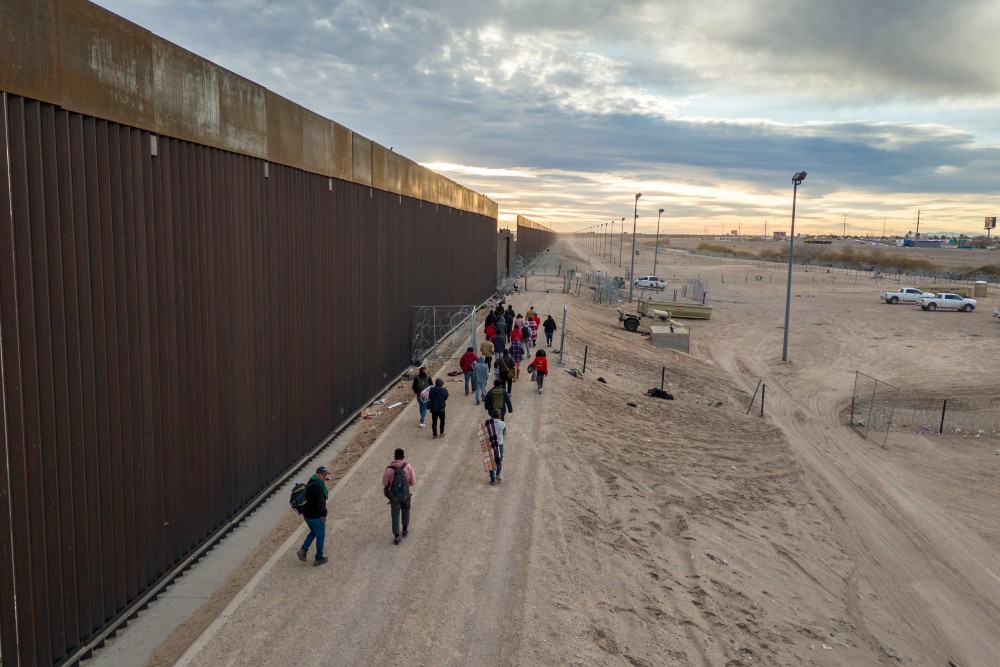
PROSPECT HEIGHTS — Multiple Catholic immigration advocates have spoken out this week against the Biden administration’s move to expand previously implemented asylum restrictions, with one opining that the decision shows “an alarming absence of moral compass.”
In June, the Department of Homeland Security and the Department of Justice issued a joint interim final rule that barred migrants who cross the southern border unlawfully from receiving asylum unless the seven-day average of daily illegal border crossings was below 1,500.
On Sept. 30, DHS announced that the rule had dropped in the interim tag and expanded. Per the updated rule, the asylum ban will only be lifted if the average daily number of migrants who cross the southern border unlawfully is below 1,500 for 28 days straight.
There is no timeline for when asylum could be restored.
“The latest restrictions on asylum processing at the border by the Biden-Harris administration demonstrate an alarming absence of moral compass,” Dylan Corbett, executive director of the El Paso-based Hope Border Institute, said in an Oct. 1 statement.
Kelly Ryan, the executive director of the Jesuit Refugee Service/USA, called the move “illegal,” considering international law protects the right to asylum. She also said the move is the wrong approach to solving the complicated issue that is the nation’s immigration system.
“The U.S. should not slam its door to people who need asylum with a take-a-number process. The U.S. has the means, the resources, and the ingenuity to run an effective asylum system,” Ryan said in a Sept. 30 statement. “This rule is an end-run around asylum, it endangers lives, and it crushes hope for those who genuinely need protection.”
While advocates — Catholic and non-Catholic alike — have spoken out against the Biden administration barring asylum as a means to reduce the number of illegal border crossings, the data shows that the action has done just that. Since the interim final rule was implemented in June, the monthly totals of U.S. Customs and Border Protection encounters at the southern border have fallen to a four-year low.
According to the data, CBP encountered 107,503, 104,101, and 130,419 migrants at the southern border in August, July, and June, respectively. Those figures are the lowest totals since February 2021 and a drastic drop from the 24 months prior, when the monthly figures were routinely over 200,000.
Illegal border crossings at the southern border reached a record high last fiscal year with 2,475,669, which surpassed the record total of 2,378,686 in FY 2022. FY 2024, which just ended, also surpassed 2,000,000 encounters, even with the lower recent figures and the October figures not yet available.
In a Sept. 30 statement, Secretary of Homeland Security Alejandro Mayorkas emphasized that the recent drop in illegal border crossings shows that the asylum ban “has been delivering results.”
“This action has been taken in parallel with other Administration actions that have both increased enforcement and delivered to asylum seekers safe and lawful pathways to humanitarian relief that cut out the ruthless smuggling organizations that prey on the vulnerable,” Mayorkas said.
Conversely, Ryan argued that the reduction of border crossings since June has come at the expense of human dignity and respect for international law. Ryan noted that the current approach to the border forces asylum seekers at the southern border to endure months-long wait periods in perilous conditions. She also highlighted that the organization is aware of a “tragic” number of asylum seekers being turned back even as they presented genuine claims of credible fear that should have made them eligible for admission.
“It’s an extremely disappointing turn for our nation, which has for so long been the world leader in offering safe haven to those enduring persecution, war, or other potentially lethal violence,” Ryan said.
The final rule, as was the case with the interim version, only applies to those who enter the United States between the designated legal ports of entry, who are immediately turned away. Those who apply for asylum at legal ports of entry through the federal government’s appointment system are exempt. Unaccompanied children and those with serious medical conditions are exempt from the rule, as well.
The updated rule does, however, add more migrants — including unaccompanied children — to the data used to calculate the crossing average, which will make the threshold more difficult to meet. Corbett, who is also an official at the Vatican’s Migrants and Refugees Section, said factoring in the arrival of children to deny asylum processing to other vulnerable people is “troubling.”
A spokesperson for Bishop Mark Seitz of El Paso, the U.S. Bishops’ Conference Migration Committee Chair, said on Oct. 2 that he was unavailable to comment on the Biden administration’s final rule. In June, he called the interim rule “deeply disturbing” and called on President Joe Biden to reverse course.
Corbett, on Oct. 1, echoed that call.
“We call on the Biden-Harris administration to urgently reverse course by fully restoring access to asylum at our border and to acknowledge the lives and dreams of those we call neighbors at our US-Mexico border,” Corbett said.
